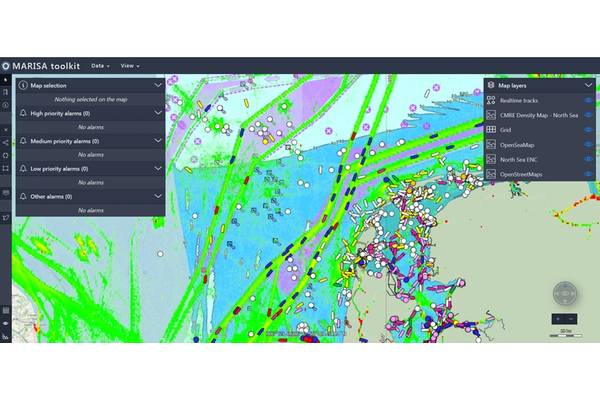

While the sea is vital to the European economy, it can also be a haven for criminals and terrorists. Threats in the maritime domain include piracy, trafficking of drugs and arms, illegal immigration, illicit trade, illegal fishing, and environmental crimes. Maritime accidents and disasters are also a concern.
Securing maritime traffic and human lives is fundamentally important for our continued well-being. The most important way to cost-effectively enhance security and safety at sea is to cooperate at national and international levels.
Considering the number of European governments and other agencies that undertake missions on the sea, there is a real need to enhance cross-border and cross-sectoral cooperation to deliver better maritime security. To meet that need, the European Union (EU) Maritime Security Strategy (EUMSS), advocates “strengthening of […] information exchange to optimize the surveillance of the EU maritime area and its maritime borders.” EUMSS provides a common framework, creating the link between internal and external policies and bridging the civilian and military worlds.
Strengthening information exchange and collaboration is a necessary goal, but not always an easy task. Enter the Maritime Integrated Surveillance Awareness (MARISA) initiative, a project funded by the European Commission. This project comes at a time when the benefits of data exchange have been proven; definitions of the European Common Information Sharing Environment (CISE) data model, services, and nodes exist; and information sharing is progressively becoming operational.
MARISA focuses on taking these technology benefits to the next level, while being completely integrated within the European policy framework. With twenty-two partners from nine European countries working together to develop the solution, MARISA helps coast guard organizations monitor the situation at sea.
With the increasing number of activities in the maritime domain, it has become extremely difficult to monitor all these activities without the help of advanced systems. Identifying suspect maritime situations requires knowledge and expertise from the coast guards. Yet, a system that can leverage various data sources, fuse them, and extract insights for detecting suspicious maritime behavior is extremely helpful to equip these forces with information and increase situational awareness.
 The MARISA toolkit has been designed to leverage the power of individual source data such as satellite imagery, vessel Automatic Identification System (AIS) data or Open-Source Intelligence (OSINT). Image courtesy Hexagon
The MARISA toolkit has been designed to leverage the power of individual source data such as satellite imagery, vessel Automatic Identification System (AIS) data or Open-Source Intelligence (OSINT). Image courtesy Hexagon
The MARISA toolkit has been designed to leverage the power of individual source data such as satellite imagery, vessel Automatic Identification System (AIS) data or Open-Source Intelligence (OSINT). It can also integrate advanced services that analyze those sources to create correlated information. That’s when the machine can go much faster than the human and helps with repetitive analysis tasks.
The other key aspect to the MARISA toolkit is its Maritime Situational Awareness Web Console. Having the data is important, but presenting it with high accuracy in a professional layout, without any latency, in a modern web architecture was part of the innovation of the MARISA project. The operators need the right level of information at the right time to allow them to take the best decision. That’s a challenge, but the collaboration between the project partners and the practitioners made it possible.
For the specific part of human-machine interface, Hexagon’s LuciadRIA Web Framework was used to leverage all the various information provided by the services and their data. The LuciadRIA API provides powerful user interface components to support visualization of large volumes of data and provides an easy and optimized interaction for the operator. It demonstrated that even if the user requirements were numerous and complex, the MARISA solution could satisfy their expectations.
But what makes such a research project successful? Research activities often lead to a lot of documents and some presentations. But is that enough to convince coast guards that their collaboration was important? Of course not.
The MARISA project was articulated around two sets of trials, with five trials each, coordinated by MARISA partners in collaboration with practitioners from marines, coast guards, and national ministries of defence (MOD). The purpose of these trials was to test, evaluate, and validate the MARISA toolkit configured for various scenarios. One trial demonstrated the collaboration between the Italian Navy and the Greek MOD. Another one involving the Dutch Coast Guard targeted a comparison between MARISA and its legacy system, not using simulated data, but with real vessels and real people. When a research project reaches that level of validation, the partners can be satisfied of the result.
Following these successful trials, the MARISA project was approved by the European Commission. European security services now have new tools at their disposal to detect, assess and respond to emerging situations quicker than before, while maintaining common understanding across borders. MARISA has been able to demonstrate how cooperation between governments can lead to safer and more secure seas for Europe.
Maritime Integrated Surveillance Awareness (MARISA) is a project funded by the European Commission. This project received funding from the European Union’s Horizon 2020, research and innovation programme, under grant agreement N. 740698.




